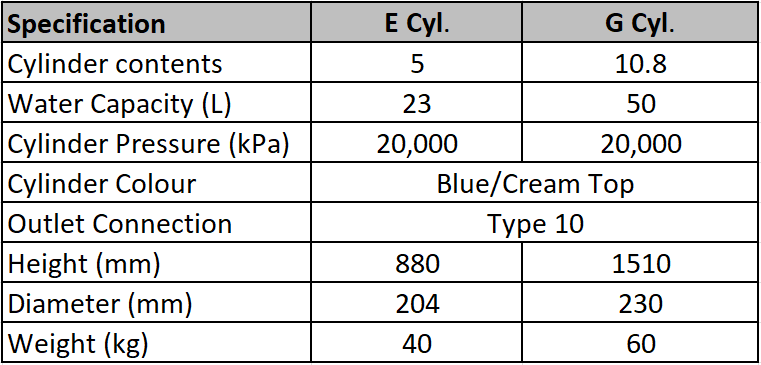Argon C18

Argon C18
Typical Uses
- MIG Welding of Mild and Carbon Manganese Steels
Order
Enquire Today
Description
A shielding gas mixture which provides weld of excellent appearance. Suitable for use on low alloy, high tensile, quenched and tempered steels. Suitable for solid wires and some flux core wires.
Main hazards
- Compressed high pressure gas in cylinders
- Asphyxiant in high concentrations.
Typical Uses
MIG Welding of Mild and Carbon Manganese Steels
Advantages
Heavy section, deep penetration, low to medium spatter
The CO₂ content in these gases is ideal for welding galvanised metals.

Cylinder dimensions are approximate – variations may occur due to manufacturing tolerances. Height includes the valve.
Container sizes may vary from state to state
Storage and handling
Ensure adequate ventilation for all cylinders and packs. Secure single cylinders in upright position and protect valves and manifolds from accidental damage.
- Keep cylinders and packs in a cool area away from all sources of heat.
- Close all valves when not in use.
- Ensure all regulators and other devices attached to the cylinder outlets are free from oil and grease, and able to withstand contents
- pressures. Check for leaks regularly.
- Do not store cylinders in an area where in an area where any leaking gas could accumulate.
- If valve is damaged, do not attempt to operate.
- If valve does not operate by hand, return the cylinder to the supplier (attach a “faulty” tag).
N.B. Only regulators, manifolds and ancillary equipment, rated for the appropriate pressure and compatible with the relevant gas, shall be connected to or downstream of these cylinders.
In case of leaks
- If cylinder or pack is suspected of leaking, evacuate personnel from the direction in which the gas is likely to flow. Stop leak if possible.
- Major leaks should only be approached with breathing apparatus.
- If possible and if safe to do so, remove leaking cylinder or pack to a safe area outdoors and allow contents to empty into atmosphere.
- Return empty cylinders and pack to supplier with a note to confirm the leak occurred
- Notify emergency services if required
Description
A shielding gas mixture which provides weld of excellent appearance. Suitable for use on low alloy, high tensile, quenched and tempered steels. Suitable for solid wires and some flux core wires.
Main hazards
- Compressed high pressure gas in cylinders
- Asphyxiant in high concentrations.
Typical Uses
MIG Welding of Mild and Carbon Manganese Steels
Advantages
Heavy section, deep penetration, low to medium spatter
The CO₂ content in these gases is ideal for welding galvanised metals.

Cylinder dimensions are approximate – variations may occur due to manufacturing tolerances. Height includes the valve.
Container sizes may vary from state to state
Storage and handling
Ensure adequate ventilation for all cylinders and packs. Secure single cylinders in upright position and protect valves and manifolds from accidental damage.
- Keep cylinders and packs in a cool area away from all sources of heat.
- Close all valves when not in use.
- Ensure all regulators and other devices attached to the cylinder outlets are free from oil and grease, and able to withstand contents
- pressures. Check for leaks regularly.
- Do not store cylinders in an area where in an area where any leaking gas could accumulate.
- If valve is damaged, do not attempt to operate.
- If valve does not operate by hand, return the cylinder to the supplier (attach a “faulty” tag).
N.B. Only regulators, manifolds and ancillary equipment, rated for the appropriate pressure and compatible with the relevant gas, shall be connected to or downstream of these cylinders.
In case of leaks
- If cylinder or pack is suspected of leaking, evacuate personnel from the direction in which the gas is likely to flow. Stop leak if possible.
- Major leaks should only be approached with breathing apparatus.
- If possible and if safe to do so, remove leaking cylinder or pack to a safe area outdoors and allow contents to empty into atmosphere.
- Return empty cylinders and pack to supplier with a note to confirm the leak occurred
- Notify emergency services if required